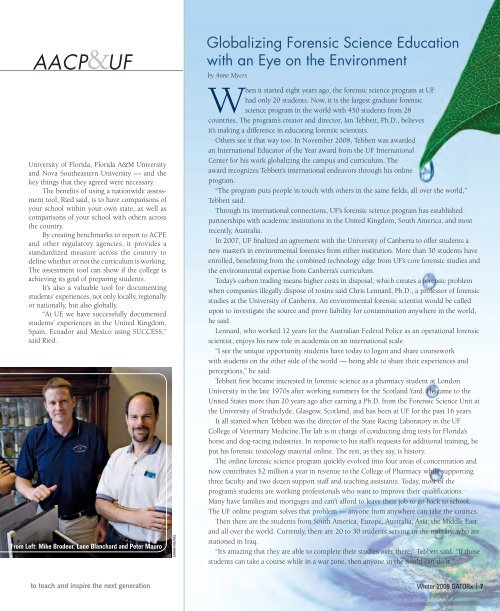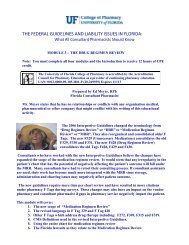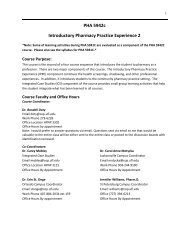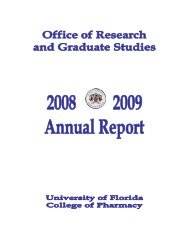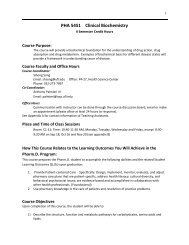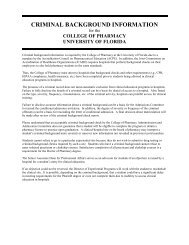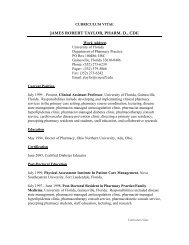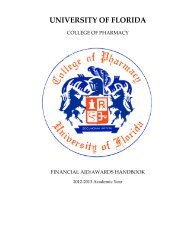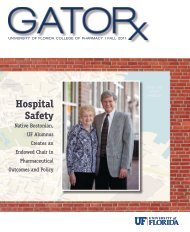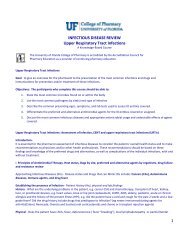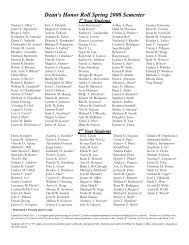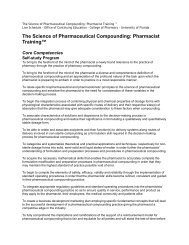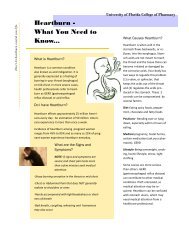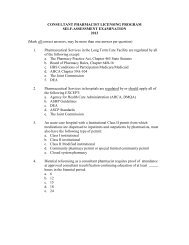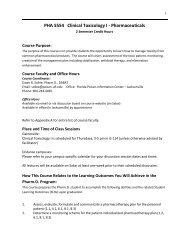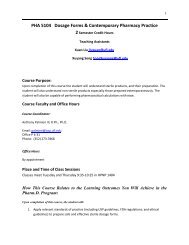Depths - College of Pharmacy - University of Florida
Depths - College of Pharmacy - University of Florida
Depths - College of Pharmacy - University of Florida
Create successful ePaper yourself
Turn your PDF publications into a flip-book with our unique Google optimized e-Paper software.
AACP &UF<br />
<strong>University</strong> <strong>of</strong> <strong>Florida</strong>, <strong>Florida</strong> A&M <strong>University</strong><br />
and Nova Southeastern <strong>University</strong> — and the<br />
key things that they agreed were necessary.<br />
The benefits <strong>of</strong> using a nationwide assessment<br />
tool, Ried said, is to have comparisons <strong>of</strong><br />
your school within your own state, as well as<br />
comparisons <strong>of</strong> your school with others across<br />
the country.<br />
By creating benchmarks to report to ACPE<br />
and other regulatory agencies, it provides a<br />
standardized measure across the country to<br />
define whether or not the curriculum is working.<br />
The assessment tool can show if the college is<br />
achieving its goal <strong>of</strong> preparing students.<br />
It’s also a valuable tool for documenting<br />
students’ experiences, not only locally, regionally<br />
or nationally, but also globally.<br />
“At UF, we have successfully documented<br />
students’ experiences in the United Kingdom,<br />
Spain, Ecuador and Mexico using SUCCESS,”<br />
said Ried.<br />
From Left: Mike Brodeur, Lane Blanchard and Peter Mauro<br />
to teach and inspire the next generation<br />
SARAH KIEWEL<br />
Globalizing Forensic Science Education<br />
with an Eye on the Environment<br />
by Anne Myers<br />
When it started eight years ago, the forensic science program at UF<br />
had only 20 students. Now, it is the largest graduate forensic<br />
science program in the world with 450 students from 28<br />
countries. The program’s creator and director, Ian Tebbett, Ph.D., believes<br />
it’s making a difference in educating forensic scientists.<br />
Others see it that way too. In November 2008, Tebbett was awarded<br />
an International Educator <strong>of</strong> the Year award from the UF International<br />
Center for his work globalizing the campus and curriculum. The<br />
award recognizes Tebbett’s international endeavors through his online<br />
program.<br />
“The program puts people in touch with others in the same fields, all over the world,”<br />
Tebbett said.<br />
Through its international connections, UF’s forensic science program has established<br />
partnerships with academic institutions in the United Kingdom, South America, and most<br />
recently, Australia.<br />
In 2007, UF finalized an agreement with the <strong>University</strong> <strong>of</strong> Canberra to <strong>of</strong>fer students a<br />
new master’s in environmental forensics from either institution. More than 30 students have<br />
enrolled, benefitting from the combined technology edge from UF’s core forensic studies and<br />
the environmental expertise from Canberra’s curriculum.<br />
Today’s carbon trading means higher costs in disposal, which creates a forensic problem<br />
when companies illegally dispose <strong>of</strong> toxins said Chris Lennard, Ph.D., a pr<strong>of</strong>essor <strong>of</strong> forensic<br />
studies at the <strong>University</strong> <strong>of</strong> Canberra. An environmental forensic scientist would be called<br />
upon to investigate the source and prove liability for contamination anywhere in the world,<br />
he said.<br />
Lennard, who worked 12 years for the Australian Federal Police as an operational forensic<br />
scientist, enjoys his new role in academia on an international scale.<br />
“I see the unique opportunity students have today to logon and share coursework<br />
with students on the other side <strong>of</strong> the world — being able to share their experiences and<br />
perceptions,” he said.<br />
Tebbett first became interested in forensic science as a pharmacy student at London<br />
<strong>University</strong> in the late 1970s after working summers for the Scotland Yard. He came to the<br />
United States more than 20 years ago after earning a Ph.D. from the Forensic Science Unit at<br />
the <strong>University</strong> <strong>of</strong> Strathclyde, Glasgow, Scotland, and has been at UF for the past 16 years.<br />
It all started when Tebbett was the director <strong>of</strong> the State Racing Laboratory in the UF<br />
<strong>College</strong> <strong>of</strong> Veterinary Medicine.The lab is in charge <strong>of</strong> conducting drug tests for <strong>Florida</strong>’s<br />
horse and dog-racing industries. In response to his staff’s requests for additional training, he<br />
put his forensic toxicology material online. The rest, as they say, is history.<br />
The online forensic science program quickly evolved into four areas <strong>of</strong> concentration and<br />
now contributes $2 million a year in revenue to the <strong>College</strong> <strong>of</strong> <strong>Pharmacy</strong> while supporting<br />
three faculty and two dozen support staff and teaching assistants. Today, most <strong>of</strong> the<br />
program’s students are working pr<strong>of</strong>essionals who want to improve their qualifications.<br />
Many have families and mortgages and can’t afford to leave their job to go back to school.<br />
The UF online program solves that problem — anyone from anywhere can take the courses.<br />
Then there are the students from South America, Europe, Australia, Asia, the Middle East<br />
and all over the world. Currently, there are 20 to 30 students serving in the military, who are<br />
stationed in Iraq.<br />
“It’s amazing that they are able to complete their studies over there,” Tebbett said. “If those<br />
students can take a course while in a war zone, then anyone in the world can do it.”<br />
Winter 2009 GATORx | 7


